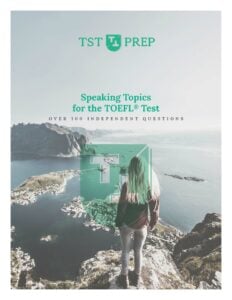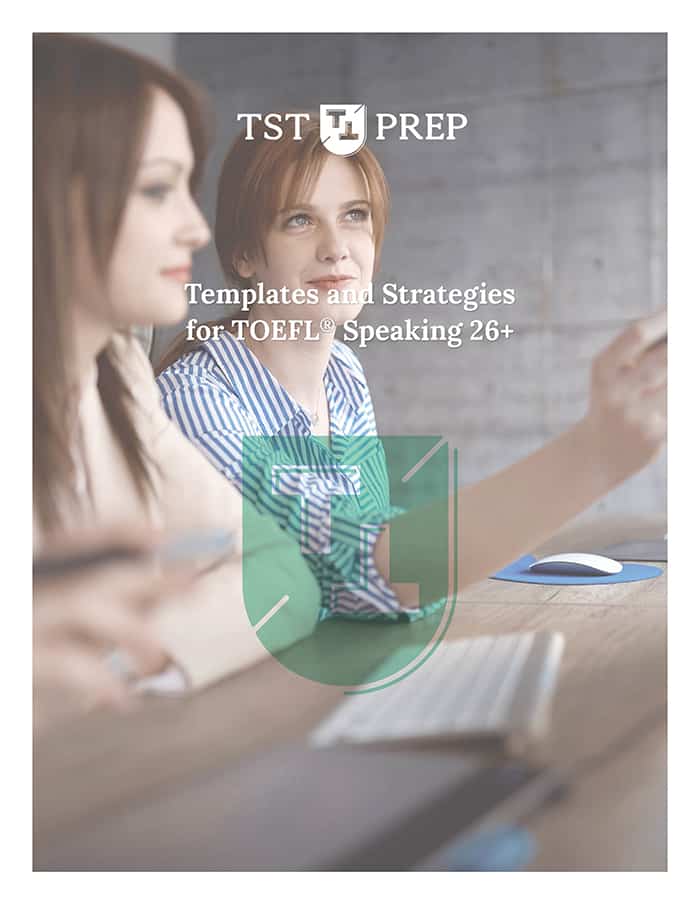Questions, Topics and Sample Answers for the Speaking Section of the TOEFL® Test

You have the TOEFL books.
You have watched the TOEFL videos.
But you are still not sure exactly how to deliver high-scoring responses for each of the TOEFL Speaking questions.
The TOEFL Reading and Listening sections are a bit easier because you can easily check your answers. However, for the TOEFL Speaking section, it is tricky to judge whether you are speaking in a way that will earn a high score.
Imagine trying to learn how to play the violin. You buy books about the violin. You watch YouTube videos explaining the history of the violin. But what you really need to do is pick up the violin and start to play. And once you start to practice, you will listen to other violin players and incorporate their style into your own.
It’s the same for the TOEFL.
Wouldn’t it be much easier if you had some TOEFL Speaking topics with sample answers that you could compare to your own responses?
Look no further.
These TOEFL Speaking topics and sample answers were updated in and reflect the new version of the TOEFL test, which changed in 2019. They have been carefully crafted to show you the ideal structure for each question type.
You no longer have to wander around TOEFL books and resources for TOEFL Speaking question samples to study and imitate. Study these questions and audio answers carefully to get a clear picture of how to respond and practice at home so you can achieve your TOEFL dream score.
Take your TOEFL studies one step further, download our free PDF that includes over Speaking Topics for the TOEFL Test
Use the table below to navigate through the sections.
TOEFL Speaking Topics
Every student’s TOEFL journey is different and some will require more effort than others.
Remember, great musicians do whatever it takes to achieve their goal. Some have to put more work in than others, but the reward is that they live a life without any regrets.
I want to make sure you take the TOEFL with zero regrets, which is why I have added 20 TOEFL Speaking topics for you to practice at home so you can get your TOEFL Speaking score and move on with your life.
- Imagine that you have just begun studying at a new university. Which of the following do you think would be the best way for you to learn about the new campus?
- a second-year student gives you a personal tour of the whole campus
- you are given a detailed map of the campus designed by the student services department
- you join a group tour of the campus together with all the other new students
- You are required by your school to join a club. Which type of club would you choose?
- academic
- sports
- volunteer
- During your senior year of college, you must volunteer at the school library. Would you rather:
- stack books
- read to children
- help with Internet searches
- You have been asked to choose between two apartments to live in next semester: one apartment is near the campus but slightly expensive, and the other is a little far from campus but cheaper. Which one would you prefer and why?
- People learn in different ways. Some people learn by doing, other people learn by reading, and others learn by listening to people. Which of these methods of learning is best for you?
- More educators these days are using technology in the classroom. In fact, many teachers now record their lectures, upload them on a website, and ask students to watch them before their lesson. During class, students report on the lectures and discuss them together. Would you prefer to have a traditional style class or one where the lectures are pre-recorded?
- School administrators at an elementary school have recently decided to increase the amount of hours spent teaching kids about robotics, computer programming, and other elements of science and technology. However, they were forced to reduce the amount of hours spent on teaching art and music. Do you agree or disagree with this new policy?
- Many people think that students learn course materials more effectively by taking exams, while others think that students learn more effectively by doing other activities, like completing projects. Which one do you think is more effective?
- Some teachers prefer announcing their quizzes in advance, while others prefer to give surprise quizzes. Talk about the advantages and disadvantages of surprise quizzes.
- Do you think scientists should be given the freedom to test and experiment however they please, or should they be limited in what they can study?
- Do you agree or disagree with the following statement? Technology has had a negative effect on relationships between friends and family.
- Some people believe that robots will someday completely replace human beings at work while others disagree. What do you think? Give reasons and examples to support your stance.
- Do you agree or disagree: People who spend more than an hour a day on social media are less happy than those who spend less time on social media.
- Do you agree or disagree with the following statement? People must love their jobs to be happy.
- Would you prefer to work at one job your entire life or to switch jobs every five years?
- Do you agree or disagree with the following statement? Teenagers should work while they go to school so they can learn how to be more responsible.
- Do you agree or disagree with the following statement? Working for a large company is better than working for a small company.
- Which of the following companies would you prefer to work for? A company that offers you challenging and interesting projects but very few vacation days or a company that offers you a job with boring work each day but long vacations each year?
- If you were assigned a project to complete in school, how would you prefer to work?
- alone
- with classmates
- with a tutor
- Which of the following technological developments has had the greatest impact on students’ lives?
- digital books
- online classes
- Smartphones
Download our 100 TOEFL Independent Speaking topics PDF and start practicing today.
TOEFL Speaking Sample Answers: Question 1
Speaking Question 1: Topic (22)
Directions: You will now be asked a question about a familiar topic. After you hear the question, you will have 15 seconds to plan your response and 45 seconds to speak.
Many people think that students learn course materials more effectively by taking exams, while others think that students learn more effectively by doing other activities, like completing projects, which one do you think is more effective?
Preparation Time: 15 seconds
Response Time: 45 seconds
Speaking Question 1: Sample Answer (22)
Well, I’d have to say that I feel students learn better by doing other activities than taking exams. For one, when I was a student, any time there was an exam coming up, I would cram. The day or two before test day, I would shove as much information into my short-term memory as possible, and then, after the exam, I would forget everything. Another reason for this opinion is that students learn in all sorts of ways, not just from taking tests. By doing other activities, like projects, students with alternative learning styles have a better chance of retaining the course materials. These are the reasons why I think students learn more effectively through other activities rather than exams.
Short Response Analysis
Delivery: Delivers her response in a clear and calm manner.
Language Use: She uses casual phrases that signify a high level of fluency (i.e. “I’d have to say…”)
Topic Development: She explains her opinion well, but suffers from poor time management. This lasted 52 seconds but you only have 45 seconds on test day.
Speaking Question 1: Topic (24)
Directions: You will now be asked a question about a familiar topic. After you hear the question, you will have 15 seconds to plan your response and 45 seconds to speak.
Some people believe that television has a negative impact on children and should be avoided. Others feel that television is one of many ways a child can learn. Which do you believe?
Preparation Time: 15 seconds
Response Time: 45 seconds
Speaking Question 1: Sample Answer (24)
This is actually an interesting topic that I have discussed before with my friends. I disagree that TV negatively impacts kids and should therefore be avoided. First, there are many educational programs out there, especially for young children. I remember when I was younger, I was allowed to watch Dora the Explorer every day. From that show, I learned the foundations of the Spanish language. Secondly, while there are some programs that are not kid-friendly, the television is an invention that is never going to go away. Children should not be shunned from it, but rather taught how to use the TV responsibly. Embracing TV is the best way to prepare kids for adulthood, when they can spend their time watching whatever they want.
Short Response Analysis
Delivery: Good intonation between ideas, her voice going higher in pitch when transitioning between ideas. (i.e. “First, there are…”)
Language Use: She uses specific vocabulary that makes her example feel more realistic (i.e. Dora the Explorer) and uses advanced phrases like “kid-friendly” and “educational programs”.
Topic Development: This response is way too long. Remember on test day you have only 45 seconds to speak while this response takes 56 seconds.
Speaking Question 1: Topic (25)
Directions: You will now be asked a question about a familiar topic. After you hear the question, you will have 15 seconds to plan your response and 45 seconds to speak.
Imagine you have to give your friend some bad news. Would you rather do it in a quiet private room, or a loud public place?
Preparation Time: 15 seconds
Response Time: 45 seconds
Speaking Question 1: Sample Answer (25)
I guess if I had to give a friend bad news, I would prefer to do it in a private location. This is mainly because if I were the one receiving the bad news, I would rather be told in a more intimate setting. One time, my best friend had to tell me something really bad that he saw my girlfriend doing behind my back. He told me in public, which made it even worse. I wanted to scream, but we were at a Starbucks, so I couldn’t. I didn’t want to make a scene and embarrass myself. This is why, if I were the one giving my friend some bad news, I definitely would not do it in a loud, public place but some place more private.
Speaking Question 1: Topic (26)
Directions: You will now be asked a question about a familiar topic. After you hear the question, you will have 15 seconds to plan your response and 45 seconds to speak.
You are planning to donate money to a charity and want it to have a major impact on people. Should you donate to a small local group or to a large international organization?
Preparation Time: 15 seconds
Response Time: 45 seconds
Speaking Question 1: Sample Answer (26)
Hands down, I would donate my money to a small local group. For one, I think that local charities do more for my community. When I was growing up, my parents always had us volunteer during the summer with a group that repaired the homes of those less fortunate in our town. Of course, someone had to pay for the supplies and equipment, but we provided the labor. Not only did those people get remodeled houses to live in, but our overall community was improved. If I had to donate money instead of time, I would donate to a local charity like that one because I would be able to see the impact that I was making on a more local level.
Speaking Question 1 (27)
Directions: You will now be asked a question about a familiar topic. After you hear the question, you will have 15 seconds to plan your response and 45 seconds to speak.
Which of the following companies would you prefer to work for? A company that offers you challenging and interesting projects but very few vacation days, or a company that offers you a job with boring work each day, but long vacations each year.
Preparation Time: 15 seconds
Response Time: 45 seconds
Speaking Task 1: Sample Answer (27)
I would much rather have a boring job each day and longer vacations. First of all, I love to travel, so no matter what, I would want as many vacations as possible. When I was little, my mom worked for a company that offered few vacation days, so it was very unfortunate for our family because we hardly ever got away. Not only that, but I believe there are other things that can be interesting and exciting in your life besides your job. Even if work is boring, you can still have a good time with your friends and family or doing sports and hobbies in your free time. While interesting work projects would be nice too, they are certainly no substitution for long vacations every year.
Speaking Question 1: Topic (28)
Directions: You will now be asked a question about a familiar topic. After you hear the question, you will have 15 seconds to plan your response and 45 seconds to speak.
Some people enjoy going to parties and meeting new people while others prefer to stay at home and relax. Which do you prefer?
Preparation Time: 15 seconds
Response Time: 45 seconds
Speaking Question 1: Sample Answer (28)
Without a doubt, I am the kind of person who prefers to stay in and relax. To be honest, I am an introvert, and I just don’t like meeting new people. Going to a party, meeting new people, and making small talk just sounds like a nightmare to me. I never know what to say. In addition to that, there is just something so comforting about spending an evening at home, relaxing. I have the most comfortable couch in my living room, and most nights I enjoy curling up with a good book or watching a movie with my dog. I love the peace and quiet. So, yeah, I would totally prefer to stay at home and relax.
Speaking Question 1: Topic (29)
Directions: You will now be asked a question about a familiar topic. After you hear the question, you will have 15 seconds to plan your response and 45 seconds to speak.
You have decided that you will learn a new hobby. Which of the following would you choose?
- Study a new language
- Learn how to play an instrument
- Join a sports team
Preparation Time: 15 seconds
Response Time: 45 seconds
Speaking Question 1: Sample Answer (29)
To me, joining a sports team would definitely be the new hobby I would choose to learn. For one, playing sports is an excellent way to make new friends. It can be difficult to meet people these days, especially ones that share a common interest. But, if you enjoy the sport, your teammates will obviously enjoy it too. Another reason I would choose to join a sports team is because it keeps you fit. When I used to play volleyball, it was very physical. I never had to go to the gym, because I was able to stay healthy by playing volleyball every week. These are the reasons why, if I had to learn a new hobby, I would definitely join a sports team.
These TOEFL Speaking questions and answers are helpful, right?
Finding models to study and imitate is the same exact thing musicians do to help improve their performance.
And after working with hundreds of students who earned their TOEFL Speaking score, I can tell you that while these sample responses are helpful, you might still have some trouble checking and grading your own responses.
Use the following checklist for all your independent speaking responses so you can analyze your weaknesses and improve your score. Here’s how you do it:
- Step 1: Record your response
- Step 2: Listen back to your response with the checklist
- Step 3: After finishing the checklist, choose one part of your speaking you would like to improve
- Step 4: Try the same question again, this time focusing on your one weakness
Independent Speaking Checklist |
|
|---|---|
| Questions | Notes |
| 1. Did I speak for 42-45 seconds? | |
| 2. Was my introduction 12 seconds or less? | |
| 3. Did I have enough time to include a short conclusion (7 seconds or less)? | |
| 4. Did I look at the clock to monitor my time at least twice? | |
| 5. Did I include at least two transitional words or phrases? | |
| 6. Did I speak at a smooth and even pace for the majority of my response? | |
| 7. Did I speak in a natural and conversational tone (no robot voice)? | |
| 8. Did I elaborate on the topic with a well developed personal example or anecdote? | |
Now, let’s look at some more TOEFL Speaking topics, but this time we will find examples for integrated questions 2, 3, and 4.
TOEFL Speaking Sample Answers: Question 2
- Speaking Question 2: Topic (8)
- Speaking Question 2: Sample Answer (8)
- - Response Analysis
- -- Transcript
Speaking Question 2: Topic (8)
Directions: You will now read a short passage and then listen to a conversation on the same topic. You will then be asked a question about the passages. After you hear the question, you will have 30 seconds to prepare your response and 60 seconds to speak. Read a student letter in the university newspaper. You will have 45 seconds to read the letter. You may begin reading now.
Increase Library Staff
The library is in desperate need of more staff. The librarians are so overworked and exhausted. They have to run around tired trying to help students, and everyone ends up waiting an extremely long time. The library gets backed-up and no one wins. Even though there are some student workers, they are not much use. They don’t know what they’re doing, so the librarians have to do all the work. The school should hire some more professional librarians to assist our busy and crowded library as soon as possible. Remember everyone, finals are just around the corner, and we need a functioning library before then!
Sincerely,
Tamara Schull
Now listen to two students discussing the letter:
Now answer the question.
The man expresses his opinion on the increase in library staff. State his opinion and explain the reasons he gives for holding that opinion.
Preparation Time: 30 seconds
Response Time: 60 seconds
Speaking Question 2: Sample Answer (8)
The student’s letter proposes an increased amount of staff working at the library. In it, the author notes that the library is too busy. She feels that the librarians are overworked and that the student workers do not have the necessary qualifications to help students. In response, the man in the conversation totally disagrees with the author. To start, he explains that the library is not busy most of the time. In fact, it is almost always empty. He says that it is only busy for an hour right after class. Secondly, he has talked with some of the student workers in the library, and he feels that they actually know more than the librarians. As you can see, the man clearly does not believe that the school needs to hire more librarians.
Response Analysis
Delivery: She has good examples of stress and intonation, showing an emotional connection to what she is saying. For example, the way she stressed the word “totally” signals an advanced level of fluency.
Language Use: Some of the sentences are a bit simple, starting with phrases like “He says…” or “She feels…” but the rest of the vocabulary sounds natural, conversational and connected to the content of the passages.
Topic Development: This example is too short. It is only 52 seconds when on test day you will have 60 seconds to speak. Try not to have more than three seconds of silence. Besides that, the structure is excellent, the speaker began with the announcement and then transitioned to the man in the conversation.
Transcript
Woman: Hey Adam, what’s new?
Man: Not much. I just finished reading this letter in the paper.
Woman: Oh, Tamara’s?
Man: Yeah, that’s the one.
Woman: What did you think?
Man: I completely disagree with her. I don’t think there is anything wrong with the library.
Woman: Well, it does get backed-up sometimes.
Man: Only for an hour or so, and that is right after classes let out. The rest of the time it is completely empty. If some students could just wait until later, they could get help no problem and the librarians wouldn’t get so far behind. That’s the only reason it seems so busy.
Woman: Yeah, I suppose you are right.
Man: And, I can’t believe she thinks that the student workers in the library don’t know what they are doing. I know a few of them, and I think that they actually know more than the librarians. One time I needed to find something online for class, and the librarian working didn’t know what I was talking about. However, the student worker helped me find it, print it, and I turned it in no problem.
Woman: Well, if that’s the case, even more librarians probably wouldn’t help then.
Man: Exactly. I hope the school doesn’t take her letter seriously.
TOEFL Speaking Sample Answers: Question 3
- Speaking Question 3: Topic (8)
- Speaking Question 3: Sample Answer (8)
- - Response Analysis
- -- Transcript
Speaking Question 3: Topic (8)
Directions: You will now read a short passage and then listen to a lecture on the same topic. You will then be asked a question about the passages. After you hear the question, you will have 30 seconds to prepare your response and 60 seconds to speak. Now read a passage from a business textbook. You have 45 seconds to read the passage below. You may begin reading now.
Scarcity Marketing
One of the principal aims of marketing is to figure out what drives consumers to buy products. Some people buy items because everyone else has one. Others buy goods that are rare and they want to be one of the few people to own it. The latter is an example of scarcity marketing. For nearly a century, advertisers have been aware of the positive effect that scarcity marketing has on sales. For example, expressions like, “one of a kind,” or “only a few left in stock,” attracts and encourages consumers to purchase larger quantities at higher prices.
Now listen to a lecture about this topic in a marketing class:
Now answer the question.
Explain how the example from the lecture illustrates the concept of scarcity marketing.
Preparation Time: 30 seconds
Response Time: 60 seconds
Speaking Question 3: Sample Answer (8)
Scarcity marketing is the idea that some consumers buy things just because they want to be one of the only people to own it, and so in response, companies will advertise their products in a manner that makes them seem like they are rare. The lecturer delves deeper into scarcity marketing by providing an example from his personal life. He tells the story of his grandfather’s shoe factory. When his father joined the family business, he wanted to use the scarcity marketing techniques he noticed were being used by other businesses. He was able to convince the grandfather to release an ad for boots that said there were only a few boots available. Because of this, the boots sales increased dramatically, from just 500 pairs in a year to over 50,000. If I ever own a company, I will definitely use scarcity marketing to advertise my product.
Response Analysis
Delivery: Her pronunciation and overall speech music are excellent. She has no problem linking words together like “…is the idea that…” and “...there were only a few boots…”
Language Use: The vocabulary is connected to the topic of the passages and she included some interesting vocabulary like “dramatically” and “rare”.
Topic Development: This example is a bit short, 53 seconds. Try not to have more than three seconds of silence on test day. However, she included all of the important information from the passages and showed how one detail leads to another.
Transcript
So, whenever I think about this concept, I am immediately reminded of my grandfather’s shoe factory back in my hometown. While my grandfather’s company made quality, custom shoes, he struggled for most of his life to make it a success.
However, when my father graduated from college, he went into the family business and joined my grandfather in the shoe factory. He noticed that other companies would often use scarcity marketing in their advertisements. For example, he would see expressions like “Limited time offer” on these products, and one day he decided to use a similar tactic to sell shoes from the factory. Apparently, my grandfather wasn’t sure at first, but eventually, my father wore him down, and he took over the shoe company’s marketing department. The first new ad my father released simply said, “American-made boots, limited stock available.”
In the years prior, my grandfather sold less than 500 pairs of these boots every year, but thanks to my father’s scarcity marketing approach, that one simple line, ‘limited stock available’, led to sales of over 50,000 shoes that year. After that, my father and grandfather continued with this advertising plan, and the company grew into an empire. That is the power of scarcity marketing.
TOEFL Speaking Sample Answers: Question 4
- Speaking Question 4: Topic (8)
- Speaking Question 4: Sample Answer (8)
- - Response Analysis
- -- Transcript
Speaking Question 4: Topic (8)
Directions: You will now listen to part of a lecture. You will then be asked a question about it. After you hear the question, you will have 20 seconds to prepare your response and 60 seconds to speak.
Now listen to part of a lecture in a biology class
Now answer the question
Using the example of the cuckoo bird from the lecture, explain two ways in which egg mimicry is beneficial for birds.
Preparation Time: 20 seconds
Response Time: 60 seconds
Speaking Question 4: Sample Answer (8)
In the listening, the lecturer discusses a practice among cuckoo birds called egg mimicry. Cuckoos lay eggs that look the same as other birds’ eggs in size and color. The mother cuckoo lays her eggs in another birds’ nest, so that bird can’t tell the difference between her own eggs and the cuckoo’s. According to the lecturer, this practice has two advantages. First, when the baby cuckoo birds are born, the host bird raises it like its own. The baby cuckoo is provided with a home in the nest and food from their adopted mom. But also, there is an advantage to the other baby birds too, and that is protection. Should a predator try to come for the nest while the mother bird is away, the cuckoo will release a smell that wards off the predator. After hearing this talk, I now have a better understanding of egg mimicry.
Response Analysis
Delivery: Her delivery is calm and confident, but keep in mind that on test day you will be more nervous and excited, which is totally natural. Do not worry if you don’t sound as calm as this speaker, it is just an “ideal” example.
Language Use: The speaker shows that she clearly understood the content of the passages by using words and phrases like “egg mimicry”, “predator”, and “baby cuckoo”.
Topic Development: She uses good phrases to transition between ideas which help to develop the topic (i.e. “According to the lecturer…”, “First…”, “But also…”)
Transcript
So, let’s continue our conversation about the cuckoo bird. Now one interesting thing about this particular species is that it practices egg mimicry. You see, cuckoo birds lay camouflaged eggs, much smaller than a bird their size should make, in other birds’ nests. Their mimicked eggs look identical to the other eggs, so the mother bird does not notice that the cuckoo egg is not theirs. Now there are two benefits to the practice of egg mimicry. For one, the young cuckoo birds are provided a home and food by their adoptive parent, and also, the other baby birds in the nest are offered some protection.
For the cuckoo bird, egg mimicry is an easy way to have their young raised by a host bird. When the eggs hatch, the baby cuckoo bird shares in the shelter of the nest and the food brought by its newly adoptive parent. These birds also grow much larger in a shorter amount of time, so it is easier for them to compete with the others. If there is not enough food or room for all the baby birds to share, the cuckoo baby has been known to push the other baby birds out of the nest and consume all the food.
But, believe it or not, there is also a benefit for the other baby chicks sharing the nest with the cuckoo bird baby. Once the cuckoo bird hatches, it provides the nest with protection. When the mother bird leaves the nest and a hungry predator comes to take advantage of her absence, the baby cuckoo releases a smelly odor that drives the predator away. If the other babies are allowed to remain in the nest with the cuckoo, then they are, in this way, also protected from these dangers.
Just like for the TOEFL independent speaking questions, you should check your own speaking responses using a checklist. The integrated speaking checklist is slightly different, but you follow the same steps to practice your TOEFL Speaking at home.
While it may be a challenge, TOEFL takers who study sample responses, analyze their own speaking, and target their weaknesses are far more likely to get their TOEFL Speaking score.
- Step 1: Record your response
- Step 2: Listen back to your response with the checklist
- Step 3: After finishing the checklist, choose one part of your speaking you would like to improve
- Step 4: Try the same question again, this time focusing on your one weakness
Integrated Speaking Checklist |
|
|---|---|
| Questions | Notes |
| 1. Did I speak for 57-60 seconds? | |
| 2. Was my introduction 15 seconds or less? | |
| 3. Did I have enough time to include a short conclusion (7 seconds or less)? | |
| 4. Did I look at the clock to monitor my time at least twice? | |
| 5. Did I include at least two transitional words or phrases? | |
| 6. Did I speak at a smooth and even pace for the majority of my response? | |
| 7. Did I speak in a natural and conversational tone (no robot voice)? | |
| 8. Did I include all of the essential information from the reading and listening? | |
Get access to your Templates and Strategies for TOEFLSpeaking 26+ guide so you can learn exactly how to answer each TOEFL Speaking question.
Conclusion
Some TOEFL journeys will take longer than others, but the fastest and easiest way for you to earn your TOEFL score is to study these sample audio answers and model their structure and style when you respond on TOEFL test day.
We all have a famous musician that we respect and admire. While we only see their accomplishments on stage, the work it took to reach their level of mastery came through countless hours of practice, imitation, and reflection. Keep your heroes in mind as you continue to work on your TOEFL Speaking skills and become your own hero.
And don’t forget that you can download 100 additional TOEFL Speaking questions so you can keep practicing at home.
- What surprised you the most about these sample answers?
- Were you confused by any of the questions?
- Do you think we missed something?
Let us know in the comments below.
And we are always an email away at [email protected]









Hi Josh. Your videos and practice materials are really helpful to me. I wondered if you could tell me whether I can see the reading passages in the integrated tasks while answering the questions or if just the 45 seconds are considered?
Another question I wanted to ask is if conclusions and personal examples in the speaking tasks are necessary or can be left out?
Looking forward to your answer!
Hi Ivana and thank you for your questions. In regards to the speaking integrated questions, you can NOT see the reading passage when you speak. This is different in the integrated writing, where you CAN see the passage while you write.
And no, a conclusion is not necessary, it’s just something you can use at the end if you still have a couple of extra seconds. I hope that answers your questions.
Josh, thank you for your good work in giving out these resources for free. I hope to work hard and come back to thank you for all your support during this journey of TOEFL.
Hello Josh, I would like to ask if you could recommend a practicing technique. For example, do you think I should practice all 4 speaking questions on the same day? How many examples should I answer for each question a day?
Great question Bayan. It really depends on you and what you think is most helpful. Experiment, try out different approaches and see which works best. When answering a single question, I usually recommend the following workflow:
1. Set your intention – what is one thing you are going to try to do better for this particular response (i.e. improve my pronunciation of the phrase “in my opinion”
2. Prepare to answer – Try to follow the same preparation time as the test
3. Record your response – Try not to re-record your response multiple times if possible. You want to copy the test conditions.
4. Transcribe your response – if you have the patience and you find it helpful, listen back to your response and write it out. What do you notice? What can be improved?
And some other activities after that:
a. Do the same response again. Pick one thing to do better this time.
b. Listen to a sample response (provided in our complete tests.
c. Shadow the audio recordings of a sample response.
Hope that helps.
Hi sir, can you help me, please
My current level is b1 and I want at least 78 points out of 120 how long should I practice to reach this score?
Good question; it sounds like you need to get to a B2 level, which will take at least three months, maybe two depending on how you study. Focus on the speaking and writing sections since those are scores based on your production, and you will have more control over your output. Good luck, and let me know how it goes!
All your materials are very helpful in my studying TOEFL speaking section, particularly the tips. I just have one question, what are the other ways to give examples aside from drawing them from my personal experience? Can I give non-personal experience examples? Thank you
Great question! Another way is to share an anecdote from a story you heard from a friend or neighbor or even on the news or on a show. Just be careful that when you do this you will have to use reported speech grammar (i.e. “I went to the store” –> “My friend told me that he had gone to the store.”). An easy workaround is to just pretend that the story you heard was actually about you. Hope that helps!
I am having my exam tomorrow and am really nervous about the independent speaking part. However, listening to the sample responses definitely did a great job in preparing me for the test and instilling confidence. Also, I will be surely referring to the checklist for a better analysis of my weaknesses. Thanks a lot!
Hi Dhruv, I’m sure you will do great :). Good luck, and let me know how it goes.
Hey Josh, I really found all your materials and lectures very useful for my TOEFL preparation. I have my exam in 3 days and I hope I can excel in it with a good score. Thank you so much for your help!
Good luck on your exam. I know you are probably nervous. Just try and relax and remember everything you have learned. Thanks for commenting and I know you will do great!
How was your exams?
I have my exam tomorrow and I am practising here. 😀
Best of luck …cheers
This is diligent work. I haven’t worked with any TOEFL firm that are honest and professional like TST instructers. Thanks for being so knowledgable and professional to help us the English learner. You will soon be the best TOEFL organization in the USA I believe.
Thank you Alaa for commenting. Much appreciated.
thanks a lot for your expert advices..! my score improved from 21-24 in writing section and speaking from 25-28 !
Thanks for commenting 🙂 – Happy to hear it helped.
Hi Josh! I have a question, what sentences do you think are better for the conclusion part in the advantages/disadvantages questions? I have tried some but none of them sound right.. Thank you!
Hi Fernanda, good question, maybe this will help, “As you can see there about positive and negative aspects of…”
I hope that helps.
Thank you so much for these Josh!
Thanks for commenting! Glad you found it helpful 🙂
I found this very helpful. I’ve read every single post of yours and I am truly amazed from your effort. Thanks a million times for your wonderful free materials. You can never find such good materials for free so thanks again. God bless you!
I have one question if you could help me with this I would be very happy. I’ve prepared everything for the test day in every section doing those free practice tests that you have and learning the structure and I also memorized those tips to help me on the test day. Any other tip from you as an expert? My test is 3 days from now. I am stressed and I fear of failing. Is there any other thing I can do to be sure I get a high point (I need at least 100 points).
Hi there Kiara and thank you for the compliment. I’m impressed with your hard work and effort in preparing for the test. We are thrilled that you found this information useful and wish you luck on your test. In regards to additional tips, well, my advice does change depending on the student, but in general, a few days before the test, I recommend NOT studying anything new. Review old practice materials to boost your memory and improve your confidence. You don’t want to take new tests or learn new tips just a few days before the exam. It will hurt your confidence level. You want to go in feeling comfortable and confident on test day. Again, good luck and let us know how it goes 🙂
Hi Josh, i am deeply impressed by your way of teaching english. The study materials you have provided for free are asweome and quite motivating. I guess you are putting a lot of effort into your work and deeply indebited to you for this.
Thanks Sukhvinder! Really appreciate you taking the time to leave such a nice comment.
Josh, i scored a 102 in TOEFL with 26 in Reading and Writing and 25 in Listening and Speaking. All credit to your teaching lessons and videos. I am very thankful to you and have been recommending people who want to improve their English skills.
Hi Josh,
I saw your all video lectures and downloaded all the study materials that you have provided for free….I have my exam in the next month since I was not able to score good marks in my last test…I think last time I referred too many books and lectures and videos..but this time I have decided to go with your test preparation materials only and I started using materials..I hope whatever you have uploaded on the Internet for free would be enough for the exam
Happy to hear it helped. Good luck on the test! Be sure to let me know how it goes. 🙂
Thank you so much for these Josh! I just passed my TOEFL and your sample questions here really helped. Cheers!
That’s great news and thank you for sharing. Happy I could help a little 🙂
Hi, Josh,
I’m deeply indebted to you for all the help offered for free. I’m appearing for the second time to get my dream score to get admission in Doane University, Alaska. I can’t forget the cheerful smile on your face and the ease of teaching the English language. I wish you all success in this noble endeavor.
Thank you for your kind words. Good luck and let me know how it goes.
Thank you, Josh, for sharing all this extra practice with our virtual community!
Thanks for commenting, Nancy! 🙂 – Happy to hear it helped.
Hey Josh, thank you so much for helping so many people around the world to get better prepared to the test.
You live your company’s mission and that matters a lot. Even for those who are fluent in English the TOEFL test can be tricky – I found myself difficult to make anything higher than 80/85 out of the 120. Your videos, tips and posts have been great to help me on the challenge to acquire a few more points.
Cheers and all the best to you and the TST Prep team!
Hi there Gui and thank you for taking the time to leave such a nice comment. I hope our materials have helped you enough to improve your score. And let us know if there is any other way we can help 🙂
Hello, thank you so much for this information.
I think the answer for Q.24 is the same as the answer for Q.23.
Could you check it and post correct answer for Q.24 if possible?
Thank you.
Hi Kevin and thank you for the heads up! Yes, we have to change that. Thanks!
Thanks so much, Josh. The speaking topics were very helpfull, i hope i get a good score.
I hope so too Michael! Thank you for your kind words and good luck 🙂